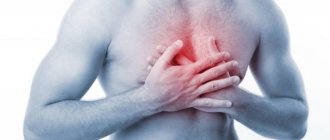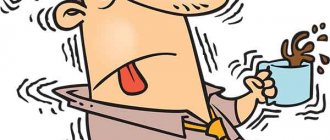These are organic somatic diseases or diseases with a known pathophysiological disorder, the development and course of which is associated with the influence of psychological factors. The use of this term to designate somatoform, somatized disorders, and especially personality reactions to illness, as A.B. Smulevich does, is quite controversial. Firstly, because somatoform disorders can be those that only imitate somatic pathology. Secondly, due to the fact that somatization is considered a mental disorder in the clinical structure of which there is a clinically significant imbalance towards the predominance of somatic symptoms. Thirdly, for the reason that the individual’s reaction to illness, or, more precisely, to how this individual perceives his illness, is manifested not only by psychosomatic symptoms, moreover, it is not these symptoms that determine the clinical nature of nosogeny.
Hypochondria, physical complaints in affective disorders and physical pathology in addiction diseases are not psychosomatic diseases.
Insomnia “became” the first psychosomatic disorder, then ulcerative colitis, peptic ulcers, migraine headaches, bronchial asthma, rheumatoid arthritis, and later some other diseases were classified as psychosomatic pathologies. The nature of psychosomatic illnesses is completely incomprehensible and unknowable if, following Descartes, we divide the body and soul as some absolute entities independent of one another. K. Jaspers believes that “the border here is quite shaky.” Nevertheless, he is in no hurry to agree with von Weizsäcker, who strives to find a psychologically understandable element in any disease.
An explanatory hypothesis could be that psychophysiological structures somehow influence the activity of internal organs. It is still not clear what exactly traumatic situations contribute to the development of psychosomatic diseases. It is believed that such development is favored by high and prolonged, throughout the year, stress load. There is a hypothesis that different and especially alexithymic individuals are prone to different psychosomatic diseases, as well as a hypothesis that different diseases are caused by different conflicts. Some researchers are of the opinion that diseases are caused by nonspecific generalized anxiety that accompanies conflicts of various types. The link between stress and psychosomatic illness is believed to be the autonomic nervous system and the endocrine system (anterior pituitary-hypothalamic-adrenal axis). Let us consider psychosomatic diseases according to the somatic systems that are affected.
The cardiovascular system
1. Coronary artery disease. Causes myocardial ischemia. It is characterized by episodic subcardial pain (angina attacks), discomfort, and pressure. Coronary insufficiency in a significant proportion of cases leads to the development of myocardial infarction. F. Dunbar described the personality of coronary patients as aggressive-compulsive - with the desire to work hard and gain authority. Later Friedman and
Rosenman identified Type A and Type B personalities, with Type A being more associated with the development of coronary heart disease. Type A personalities are action-oriented and hostilely competitive. Type B personalities, on the other hand, are calm, less aggressive, and fight less hard for their goals. In personality type A, the amount of low-density lipoprotein, serum cholesterol, triglycerides and 17-hydroxycorticosteroids is increased, which contributes to the development of coronary heart disease. When treating the disease, tranquilizers (for example, diazepam) are prescribed to ease psychological disturbances. For pain, narcotic analgesics (for example, morphine) are used. Psychotherapy is needed to maintain morale, confidence in recovery, and reduce stress, compulsion and tension.
2. Severe hypertension . Arterial hypertension is an increase in blood pressure to 160/65 or higher. Common (eg, 20% of American adults). Persons with high blood pressure are quite adequate in appearance. They complain a lot, are compulsive, and can accumulate rage, although they do not openly express anger. The disease is promoted by genetic predisposition; the tendency to suppress and repress anger translates it into illness. In addition to antihypertensive drugs (capoten, capazid, enalapril, ednit, diraton, cardaflex, etc.), supportive and behavioral psychotherapy (for example, meditation, relaxation, bioreinforcement) is successfully used in treatment.
3. Heart failure. A decrease in the volume of blood ejected by the heart reduces tissue blood flow, leading to stagnation of blood in both circulation circles. Conflicts and mental trauma often influence the onset or exacerbation of the disease. Psychotherapy therefore plays an important role in the treatment of the disease.
4. Vasomotor (vasodepressive) syncope. As a result of a decrease in sympathoadrenal and increase in vagoinsular activity, the volume of ejected blood decreases, due to vasodilation, peripheral vascular resistance decreases, and bradycardia develops. Poor blood supply to the brain and hypoxia cause fainting. All these processes seem to be triggered by fright or acute fear. Psychotherapy is needed: determining the cause of mental trauma and increasing resistance to it. In case of orthostatic collapse, the patient is recommended to slowly move to a standing position; During fainting, the patient's legs should be elevated.
5. Cardiac arrhythmias. Life-threatening arrhythmias (ventricular tachycardia, ventricular fibrillation), sinus tachycardia, ST and T wave changes, ventricular ectopy, increased plasma catecholamines and free fatty acid concentrations may be associated with emotional trauma. Emotional arrhythmia requires psychotherapy and beta blockers.
| | Arrhythmia can be one of the many symptoms of a panic attack |
6. Psychogenic cardiac complaints in persons who do not suffer from heart disease. We are talking about cardiophobia and even delusions of heart disease, which refers to an anxiety disorder; in ICD-10 it is mentioned among the manifestations of somatoform autonomic dysfunction as Da Costa syndrome (G45.30). This is also a syndrome of "neurocirculatory asthenia", described by Da Costa under the name "irritable heart". There are 20 other names for this poorly defined disorder. The disease begins at the age of 12–22 years, but also occurs in middle age, and is twice as common in women. It runs chronically with periodic exacerbations.
Diagnostic criteria: 1) respiratory complaints such as painful breathing, inability to take a deep breath, suffocation and shortness of breath; 2) palpitations, chest pain or discomfort; 3) nervousness, dizziness, weakness or discomfort in crowds; 4) excessive fatigue or limitation of activity and 5) excessive sweating, insomnia and irritability. If phobias predominate in the manifestations of the disease, psychotherapy is effective in identifying hostility, unacceptable sexual impulses, addiction, guilt, and fear of death. Physical impact programs (learning proper breathing, for example) are combined with group psychotherapy. For significant anxiety, tranquilizers (diazepam) are prescribed, for asthenia - nootropics, for vegetative dystonia - anaprilin.
The head is responsible for the thought process.
Problems with the head reflect a discrepancy between feelings and reason. Headache
Headaches became known only a few centuries ago; they were not known in earlier eras.
Krista Moots writes that headaches are often caused by chronic compression of the muscles connecting the head and back of the head. In this case, we are talking about an isometric tension headache, a diffuse, pressing pain that can last a very long time. This type of headache occurs due to too much vascular tension. The less often we relax, the more this tension affects our blood vessels. Our head reacts to the state of our internal tension through pain faster than other organs. We place too high demands on ourselves, we tend to constantly think about some problems, solve some important life problems, we do not give ourselves rest, we constantly strive to “arrange” our lives. “Prayers bring us back to the real world. A person who lives by prayer is not inclined to keep himself under tension. He realizes that he can change very little. He trusts the flow that carries him. He relaxes. He feels connected to a world that is higher than him.” Headaches
- fear;
self-criticism; feeling of one's own inferiority. Headaches
most often indicate that we are too dependent on other people's opinions, we attach exaggerated importance to what others think and say about us, or even suffer from an inferiority complex.
Any diseases associated with the head area indicate difficulties in communicating with the outside world. Thus, these diseases teach us to love and appreciate ourselves more, to forgive ourselves.. Any pain is a persistent warning about the need to pay attention to ourselves. Therefore, it is important to find out what lies behind the pain. A headache is primarily a signal from our subconscious mind that we are doing something wrong. For example, you have a lot of work, you are tired, but you want to finish the job. Your subconscious mind decides that you need a rest and gives you a headache, thereby saving you from overload and self-destruction. This is the simplest example. Hypocrisy
is another major cause of headaches. For example, you communicate with a person who is unpleasant to you. But we are forced to smile at him and say good words. The result of such communication is a headache. The mechanism of its occurrence is very simple. One hemisphere of the brain registers the unpleasant feelings caused by this person. The other is your external behavior. As a result, some head muscles are relaxed, while others are tense. The discrepancy between thoughts, images and feelings causes pain. One day I came to visit my friend. He, among other things, complained of periodic nagging headaches. The pain started six months ago. I began to ask about the events that preceded the onset of pain. He talked for a long time about the problems in his company and, talking about one partner, said automatically: “This Sergei is a complete headache.” After this phrase, which, in my opinion, was the key one, he continued his story. After a while, I stopped him and asked: “Do you remember what you said about your partner Sergei?” Of course, he didn’t remember, as he was in a slight trance. When his wife and I told him about this phrase, he was very surprised. After some time he left this. If the cause of your headaches is the discrepancy between your thoughts and your external behavior, then bring the internal and external into full compliance. In this case, two options are possible. First: no one is forcing you to communicate with this person. You can just leave him alone. Second: think about how you attracted this person into your life. If you don’t like certain qualities in someone, then you definitely have them. Change yourself, and then the people around you will change. One participant in my seminar complained that her boss treated her poorly and constantly criticized her. After communicating with him, her head literally split. And I had to communicate with him every day. “I feel like he’s vampirizing me,” the woman said. I asked her several questions. It turned out that she had a long-standing grudge against her boss. “Besides,” she added, “he reminds me of a man who once treated me badly.” It also turned out that this woman is very critical of herself. Underestimates her professional and feminine characteristics. After the seminar, she reviewed the events of the past, changed her attitude towards herself and her boss, and towards the situation as a whole. After a while, the headaches disappeared completely, and her boss began to treat her as a valuable employee. Underestimating yourself and self-criticism often lead to headaches. In addition, if a person is accustomed to underestimating and criticizing himself, then he treats others the same way. Love yourself and accept yourself as/as you are. Learn to notice only the good in people. Know: what you are used to seeing in people is what they will show you. Fear is also a cause of pain. It creates excessive stress and anxiety. Find this fear within yourself. Learn to trust the world around you - this is your world, and therefore the safest place in the Universe. Self-love and trust in the world around you dissolves any fear. Often headaches can serve certain functions. It helps to avoid some responsibilities. So, a woman, trying to avoid sexual intercourse, refers to a headache. She does this once, twice, and then, as evening approaches, she regularly begins to have a headache. And pills won't help here. You need to calmly sort things out and make a definite decision. There is a joke about this. A husband and wife were walking around the zoo. The gorilla's cage was unlocked. The monkey jumped out, grabbed the woman and dragged her into his cage. Apparently, the male liked the woman and he was going to have sex with her. The wife shouts to her husband: “Darling, why are you standing there?” Can't you see that he's trying to rape me? Do something! - Tell him that you are tired or that you have a headache. Learn to treat your headaches with care and respect. Take it primarily as a signal. Don't suppress it with pills. They will only bring temporary relief. Suppressing pain does not mean curing it. Find the causes of your pain and eliminate them. They are hidden in your thoughts and feelings.
Migraine Migraine
is
a neurological disease, the most common and characteristic symptom of which is episodic or regular severe and painful attacks of headache in one (rarely in both) half of the head.
A common migraine is characterized by attacks of pain in one side of the head, which are often accompanied by nausea and vomiting and can last from several hours to several days. A migraine attack may be preceded by visual impairment. There is also a much more severe type of migraine that can seriously affect your vision and speech. Simple painkillers do not help here. As a rule, such pain is temporarily eliminated with tranquilizers and antipsychotics. But only temporarily, since the pills do not eliminate the causes themselves. Migraine
- dissatisfaction with one's life, sexual fears.
This disease is directly related to the personality and individuality of the patient. Migraine usually develops in a person who does not give himself the right to be himself. Example: a teenage girl wants to be an artist, but her parents force her to choose another profession. She suffers from migraines because she didn't do what she wanted. Migraines occur in a person who feels guilty when he tries to speak out against those who have significant influence over him. He doesn’t know what he really needs, and he shows such helplessness that he lives as if in the shadow of another person. In addition, people suffering from migraines often experience difficulties in their sexual life because they do not develop their creativity, symbolized in the human body by the genitals. If you suffer from migraines, ask yourself the following question: “If I had ideal circumstances in my life, who would I want to BE?” After this, try to determine what has prevented or is preventing you from becoming who you want to be. As a rule, the main obstacle is the wrong way of thinking. You are mistaken in thinking that people love you more when you show your dependence on them. On the other hand, allow yourself to be imperfect and give yourself the time needed to achieve your true goal. Migraines are common among those people who want to be perfect. But they strive for perfection, constantly scolding and criticizing themselves, blaming and punishing. They are full of all sorts of inferiority complexes and guilt. Getting rid of these complexes means getting rid of pain. Svetlana fell in love with a man who often came to her hometown on business trips. He was married, but assured her that he would soon divorce. After some time, she found out that she was pregnant. She informed him about this. He promised to sort things out with his wife and return. But she never saw him again. Svetlana did not have an abortion and gave birth to a girl. Literally immediately after giving birth, she began to have severe headaches. And now this woman sits in front of me and tells me her story. Her daughter recently turned 14 years old. And throughout all these years, Svetlana regularly experienced severe migraine-like headaches every month, which did not respond to the effects of medications and turned her off from life for three days. “Doctor, I feel terribly guilty before my daughter,” Svetlana tells me with tears. “My daughter doesn’t have a father, and it’s my fault.” After all, I had intimacy with him only once. I was a girl. I was ashamed to look people in the eyes because I felt like a fallen woman. I even moved to another city in the hope that everything would be forgotten and my mental pain would go away. But, alas, my pain remained with me. Sometimes migraines reflect all sorts of fears. “Doctor,” a young girl turns to me, “I have problems with my head.” – How does this manifest itself? – Recently I started having severe headaches. No pills help. – Is there any pattern in their appearance? – I asked her. - Yes, I have. – At the same time, the girl lowered her eyes. – I recently met a guy, he is very nice. But that's not what I'm talking about. So, when he first tried to kiss me, I felt nauseous, and then a severe headache began. Now the pain happens very often, as a rule, it is associated with our meetings or even with thoughts about him. In a state of trance, we found out the reasons for such a reaction to the young man. When the girl was 13 years old and got her period, her mother decided to give her her first lesson in sex education. She explained to her that sex is very dirty, that all men need only one thing. As soon as they achieve this, they immediately abandon women, and often pregnant ones. One of the functions of the subconscious mind is protective, and this girl’s subconscious found a “wonderful” way (for lack of better ones) to take care of her decency and integrity. In this case, you need to form the right attitude towards sex from childhood. Sex cannot be sinful. This is a physical manifestation of spiritual love. Consider sex as a wonderful way to communicate with a person, and as a way to gain satisfaction from life, and as a way to purify and improve your spirituality. If you avoid sexual communication, considering it vicious, then it means you are running away from earthly things. But everything earthly was created by God, the Supreme Mind. And the metaphor about Adam and Eve, about the tempting serpent, means that a person, learning everything earthly (including sex), must still come to God. So is it worth making this path difficult and unbearable? Migraine is a sign of resistance to the flow of life. Migraine occurs as a result of a conflict between a person's natural instincts and his mind. It shows that they are trying to solve a sexual problem rationally. — Relax in the flow of life flowing through you. Accept and feel your sexuality and all the forces bubbling within you. If you no longer repress them, you will see that these forces are fundamentally positive, and you will be able to use them consciously and effectively, living more holistically. Headaches (V. Zhikarentsev)
– you consider yourself inferior, self-criticism, fear.
A new approach, a new harmonizing thought: I love and approve of myself. I look at myself and what I do with eyes full of love. I'm safe. Headaches (L. Hay)
– underestimation of oneself, self-criticism, fear. A new approach, a new harmonizing thought: I love and approve of myself. I look at myself with love. I'm completely safe.
Amnesia (memory loss), memory weakness
Fear is one of the main causes of amnesia, or memory weakness.
And not just fear, but escape from life. You try to forget everything. What advice do acquaintances most often give in unpleasant situations? “Forget about it!” And if you follow this advice, then don’t be surprised at your memory deterioration. Sometimes the subconscious, with the help of amnesia, performs a protective function for a person. Events associated with physical pain or mental suffering disappear from memory. A few years ago, my wife's friend was in a car accident. And when she was asked to talk about how it happened, she could only remember how she got into the car and how she woke up in the hospital room. She forgot everything that happened between these events. Amnesia (L. Hay, V. Zhikarentsev)
– fear, escape from life, inability to stand up for oneself. A new approach, a new harmonizing thought: I always have intelligence, courage and a high appreciation of my own personality. Living is safe.
BRAIN
Brain tumor
Brain
is stubbornness, reluctance to accept anything new in your life. - You must understand that everything in life is subject to eternal change. Growth always means change. Therefore, trust the flow of life, it will bring you to a new shore, more beautiful and perfect than your current life. This way you will become free. Brain tumors often occur in those people who want to subordinate the world around them to their worldview. They are very stubborn and refuse to accept other people's world. This leads to aggression towards people and towards the world. And the brain literally “swells” from tension. Quite recently, a guy who had mental problems came to see me. From communication with the subconscious mind, it turned out that the cause of mental disorders is strong contempt, condemnation and hatred of people. He attached great importance to such concepts as decency and morality, and he was ready to simply destroy anyone who did not meet his standards. During the treatment, it turned out that several years ago he had undergone a complex brain operation and miraculously survived. The reason is the same - high subconscious aggression towards the world and towards people. When communicating with the subconscious, the information was given in clear text: - Before you were born in this world, you lived on another planet. But now you're here. You were born on this planet. Accept this world with love. Then you will be healthy. “Most likely, this is so,” the guy confirmed, “I often have dreams in which I travel to other worlds, I am on another planet.” But how can I accept this world if there is so much injustice in it? It took several sessions for him to understand that the world we live in is very fair and harmonious. Now he feels great. Organized a youth club, got married.
Concussion
When you have a concussion, an entire area of your thinking is shaken up and called into question.
Now you cannot carry your head proudly - as soon as you lift it, you feel pain. —Leave behind the old way of thinking. Go within to include the areas of feeling and intuition in your life as well. Meningitis
- anger, fear, family discord.
Meningitis of the spinal cord (V. Zhikarentsev)
– inflamed thinking and anger at life;
very strong disagreements in the family; living in an atmosphere of anger and fear; a lot of clutter inside; lack of support. A new approach, a new harmonizing thought: I choose to create peace in my mind, body and the world around me. Everything is fine. I am safe and loved. Spinal meningitis (L. Hay)
– inflamed thoughts and anger at life.
A new approach, a new harmonizing thought: I forget all accusations and accept the peace and joy of life. Epilepsy
– feeling of persecution;
feeling of struggle; violence towards oneself. An epileptic seizure
is an experience and liberation from previously suppressed forces and aggression.
A seizure forces you to stop holding yourself in control, and thus free yourself from memories and your consciousness. — Respect the energies within you, do not judge them and do not try to repress them into the subconscious. Take a conscious look at yourself. Experience and accept everything that comes to your mind while falling asleep, and let it happen. This way you will learn to give and leave behind, without having to be forced into it by fits. Epilepsy (V. Zhikarentsev)
– feeling of persecution;
denial of life; feeling of great struggle; violence towards oneself. New approach, new harmonizing thought: I choose to view life as eternal and joyful. Eternal/eternal; I am filled with joy and peace. Epilepsy (L. Hay)
– persecution mania;
giving up life; feeling of intense struggle; violence against oneself. A new approach, a new harmonizing thought: From now on I consider life eternal and joyful. According to Edgar Cayce, sexual excesses in one life can lead to epilepsy in another, while Rudolf Steiner believed that in such cases the consequence would be pneumonia. Epilepsy in the current life can also be caused by abuse of psychic abilities in a previous life or unsatisfactory results of initiation into spiritual practice. The energy field has been distorted. As a result, all deviations from the harmonious state are imprinted in the “etheric imprint” from which the new body develops. Theosophist Annie Besant associated epilepsy with alcoholism in a previous life: the soul is irresistibly drawn to a family with a genetically traceable addiction to libations, which determines its predisposition to damage to the nervous system. Poliomyelitis
is infantile spinal paralysis, an acute, highly contagious infectious disease caused by damage to the gray matter of the spinal cord by poliovirus.
Polio – extreme jealousy. Polio (L. Hay)
– paralyzing jealousy; the desire to stop someone. A new approach, a new harmonizing thought: Enough for everyone. With my good thoughts I create all the good in me and my freedom.
***
Any idea is born on its own. You just need to give her this opportunity. More precisely, we need to give freedom to feminine energy. And even more precisely, if women gave themselves freedom, men would not consider them incapable fools. Men would realize that women are idea generators. The struggle for freedom that modern women are waging is an indicator of intelligent stupidity and at a certain moment causes those involved to feel completely meaningless. The resulting despair leads to brain disease. The deeper the misconception about this struggle is rooted, the further the consequences spread: the brain of a child or even a grandchild is affected. See Feminist movement. The brain is located in the head, and the head symbolically relates to the father. If the father believes that only he has a brain, then the unrealized brain potential of his wife turns into a brain disease in the child. This illness sums up the father’s pride in his intelligence and the mother’s shame in hers. The more a child adopts from his parents their attitude towards his own mind, that is, the more he is proud of his father’s mind and ashamed of his mother’s stupidity, the more he has to suffer himself, which can result in an incurable illness, spiritual or physical. To avoid such a fate, you need to constantly monitor your attitude.
***
Apoplexy
or massive intracerebral hemorrhage is currently referred to as hemorrhagic stroke.
The most common cause of intracerebral hemorrhage is arterial hypertension, when, against the background of high blood pressure, small penetrating arteries rupture, and therefore such hemorrhages always affect (in descending order of frequency) the putamen, thalamus, pons and cerebellum. During apoplexy, part of the brain shuts down because its blood supply is interrupted. The blow shows extreme resistance, an inner denial of life. The subsequent paralysis of a part of the body reduces your activity in the outside world. Apoplexy, seizure
- flight from family, from oneself, from life.
- Accept this instruction. You must develop the power of feeling and intuition, and pay more attention to them. Respect life in all its integrity. Pay more attention to your inner life, go inward to peace and silence. A stroke
is accumulated anger. Anger destroys. If a person is faced with a specific situation, long-term and hopeless, which does not fit in his head, an aneurysm of a blood vessel in the brain occurs - a local expansion of the lumen of the artery due to stretching and protrusion of its wall, which can burst with a sharp increase in blood pressure. As a result, a stroke occurs - a hemorrhage in the brain, resulting in paralysis. The pent-up hatred of senseless running breaks out in the form of an attack of anger, and the body refuses to run. A body paralyzed by a stroke gives a person the opportunity to reflect on his mistakes. A stroke can put a person in bed for decades. There are two possibilities for a stroke to occur: - a blood vessel in the brain bursts, - a blood vessel in the brain becomes blocked. In both cases, brain cells are left without blood, that is, without love, and die. A blood vessel in the brain bursts when a person is overcome by a sudden attack of anger and an angry desire to take revenge on someone who considers him a fool. This means that love, which has turned into anger, breaks out of the boundaries, that is, from the blood vessel. The offender for a person can be another person, people, a situation, the state, etc. Since an angry person loses the ability to think, a blood vessel must burst to prevent the person from becoming a criminal. If there was a person nearby who deserved bloody retribution, then the situation would turn in such a way that the angry person would throw out his anger on him. He would have avoided a stroke, but instead of atonement for karmic guilt he would have strengthened it. A blood vessel in the brain becomes blocked when a person suffering from an inferiority complex loses hope of proving that he is not what others think. A person finally breaks down due to the complete loss of his own dignity. Anyone who retains even a drop of self-confidence and who, thanks to this, is able to think with his own head, does not lose himself. A blocked blood vessel means that a person is holding too much inside. A stroke comes as an assistant to hide the secret powerlessness and broken will of a person. The severity and location of the stroke determine the extent to which you lose your mind and ability to move. Those who retain their reason, but their sense of guilt intensifies, will not be able to recover. And whoever experiences joy that the disease saved him from a humiliating situation recovers. The characteristics of the will to live predetermine the characteristics of recovery. Anyone who, with the hypocrisy characteristic of a frightened person, says that he wants to fully recover only enough to take care of himself, will have to take care of himself. What prevents him from finally healing is the fear of being overloaded with work again or of ending up in a situation similar to the one he had before his illness. Conclusion: if you want to avoid a stroke, release the fear of evil discontent. Then you will cease to be the object of anger and you yourself will not take your anger out on others. Your excellent brain will work as it should. You are satisfied with yourself and do not want to be better than others.
Hair problems
Hair symbolizes freedom, strength and power.
In former times, long hair was usually a sign of a free person, a sign of freedom. Short hair, on the contrary, meant a limitation of human power, freedom and dignity. - If you have problems with your hair, ask yourself what you really want, regardless of what others expect from you. If you have the courage to live only your own life, your joy in life will increase, as well as your freedom and strength - then your hair will begin to grow. By the way, split hair or hair falling out can immediately be an indication for you to interpret a person’s character. Baldness (L. Hay)
– fear, tension, desire to control everything, distrust in the process of life.
Fear and strong internal tension lead to baldness. The muscles of the hair follicles contract, they receive less nutrition, and gradually they die. Bald people tend to literally control everything. They don't trust the life process. A new approach, a new harmonizing thought: I am safe. I love and approve of myself. I trust life. Gray hair
- stress, worries, overwork.
When a person gets very nervous, his hair immediately begins to turn grey. Hair is a symbol of human vitality. They perfectly reflect his inner state. Why does hair decrease with age? Why do they fade? There is only one answer. Over the years, a person loses his vitality. Loses on negative thoughts and emotions. Which exit? Change your attitude towards yourself, people, life. And accumulate your personal power. Gray hair (V. Zhikarentsev)
– stress, belief in pressure and tension, overwork.
New approach, new harmonizing thought: I feel calm and comfortable in any area of life. I am strong and capable of doing anything I want. Hairiness (V. Zhikarentsev)
- anger that is covered up; the blanket that is commonly used is fear; desire to blame; there is often a reluctance to nourish oneself. A new approach, a new harmonizing thought: I reveal my anger and let it go. I am at peace with myself, with the people around me and with life. I give myself love and support.
References: 1. Valery Sinelnikov - Love your illness. 2. Luule Viilma - I forgive myself.
Metaphysical causes of diseases.
Eye diseases. Ear diseases. Diseases of the nose. Dental diseases. Mouth.
Copyright © 2015 Unconditional love
Respiratory system
1. Bronchial asthma. A disease of the bronchial airways that respond to various stimuli by narrowing the bronchi, excessive secretion and swelling. Asthmatics are considered to have an increased need for dependence. F. Alexander believes that the psychodynamic conflict factor is a strong unconscious need for protection and affection from the mother or a person replacing her. If support does not appear when needed, an asthma attack develops. Some patients recover if they are separated from their mother ("parentectomy"). Various methods of psychotherapy are used. Asthmatics should be treated jointly by internists, allergists and psychiatrists.
2. Hay fever. It occurs when strong psychological factors are combined with allergic elements. One factor may dominate over others, and they may also alternate in importance. Treatment combines psychiatric, somatic and allergic factors.
3. Hyperventilation syndrome. Due to one or another emotional state, patients breathe deeply and quickly for several minutes, then, due to cerebral vasoconstriction and respiratory alkalosis, dizziness occurs and fainting occurs. There may also be paresthesia and carpopedal spasm. It is important to exclude conditions such as epileptic and hysterical seizures, vasovagal or hypoglycemic attacks, myocardial infarction, asthma attacks, porphyria, Meniere's disease, pheochromacytoma, as well as anxiety attacks, panic reactions, psychotic episodes, and personality disorders. Treatment boils down to retraining breathing skills in situations that provoke an attack, as well as avoiding such situations. The attack can be stopped if the patient breathes into a paper bag.
Digestive system
1. Peptic ulcer. It is characterized by ulceration of the membrane of the stomach and duodenum, reaching the muscle layer, in areas accessible to gastric juice and pepsin. The development of the disease, according to F. Alexander, is associated with the frustration of the expressed need for dependence. This unconscious conflict develops into an intense oral-receptive need for dependence, care and affection, which in turn leads to unconscious regressive hunger or anger. The resulting vagal hyperactivation leads to hypersecretion of gastric juice, which, in the case of hereditary readiness for the disease or gastritis, gives rise to the disease. According to a non-specific theory, stress and anxiety in any conflict and in any personality type cause hyperactivity of the stomach and hypersecretion of pepsin, and then ulcers (similar to how electrical injuries cause ulcers in dogs). Drug treatment (cimetidine, ranitidine, famotidine, nizatidine, etc.), a special diet is combined with psychotherapy aimed at conflicts associated with the patient’s addiction; Bioreinforcement and relaxation can be useful.
2. Ulcerative colitis. This is a chronic inflammatory ulceration of the large intestine with bloody diarrhea, sometimes with regional inflammation of the intestine and indigestion syndrome. Patients are dominated by compulsive personality traits: neatness, a penchant for order and punctuality, shyness and restraint in expressions of anger, hyperintellectuality. F. Alexander considers the patient’s inability to fulfill obligations towards the main figure of his addiction to be the key point in the development of the disease. This stimulates oral aggressive sensations, causing feelings of guilt and anxiety. “Gifting” bloody diarrhea leads to recovery. They also point to a pathological mother-child relationship, which gives rise to feelings of “hopelessness-uselessness” and “a complex of refusing - giving up.” There is also such a theory: nonspecific stresses of many types can cause ulcerative colitis. Drug treatment includes the prescription of anticholinergic and antidiarrheal drugs, in severe cases - prednisolone; Preparations with bismuth help well against diarrhea. In the acute phase, supportive psychotherapy is indicated; for chronic manifestations, more interpretative psychotherapy is indicated.
Weight disorders
1. Obesity (body weight 20% higher than standard). There is a hereditary predisposition to obesity, and factors of early development in childhood are also important. This means that in obese children the number of cortical cells increases (hyperplastic obesity), while obesity in adults is the result of hypertrophic obesity (an increase in the size of fat cells). Psychological factors are important for hyperphagic obesity (overeating). Among the psychodynamic factors of overeating are oral fixation, oral regression and an overvalued attitude towards food; There is bulimia associated with binge drinking. The development of obesity can be facilitated by neglect of one's appearance and poor nutrition in early childhood. Treatment: Diet, as well as emotional support and special behaviors to combat anxiety and depression.
2. Anorexia nervosa. Occurs in 0.37% per 100 thousand population per year, more often during puberty; boys make up 4–6% of all patients with anorexia nervosa. Early psychodynamic theory stated that anorexics deny the desire to become pregnant by fasting because they imagine that they can become pregnant through the mouth. Another theory posits a dependent reassurance relationship between a warm but passive father and guilt for aggression towards an ambivalently viewed mother. Other authors describe body schema disorder (denial of exhaustion), self-perception disorder (unwillingness or refusal to acknowledge exhaustion, weakness, hunger), and feelings of failure due to false learned experiences. There is also a theory according to which the disease is a phobic reaction of avoiding food due to sexual and social stress during puberty; fasting reduces sexual interest, which, in turn, leads to even greater hunger strike.
Diagnostic criteria: 1) failure to maintain body weight at the minimum normal level (up to 15% of normal) and inability to achieve the expected increase in body weight during the growth period; 2) strong fear of weight gain even during periods of obvious exhaustion; 3) feeling “fat”, “too fat” even when exhausted; 4) in women, the absence of at least three consecutive menstrual cycles that were expected (a woman is considered amenorrheic if menstruation occurs only under the influence of an injected hormone, such as estrogen). During treatment, it is very important to monitor how the patient takes food, water, as well as natural waste.
It is necessary to ensure that the patient does not take anorectics, laxatives, diuretics, does not induce vomiting, and that he eats and does not hide food. It is necessary to eliminate dehydration and electrolyte imbalance. Behavioral psychotherapy contains many positive reinforcements and privileges, helping to reinforce external motivation to take food and liquids. Among the medications, aminazine is recommended, and more recently, antidepressants, in particular amitriptyline. Cyproheptadine is also used, and sometimes ECT (especially in the presence of a pronounced depressive component). Family psychotherapy is used as a means of studying intrafamily relationships and eliminating the patient’s “secondary satisfaction” from his disorder.
Skeletal muscle diseases
1. Rheumatoid arthritis. It manifests itself as muscle pain due to inflammation in the joints. Patients feel stiffness, limbs seem to be tied, movements are limited. Psychological stress is hypothesized to predispose to disease; to a large extent it is associated with hereditary, allergic, and immunological factors. Drug treatment of pain and arthritis is combined with psychotherapy (instilling confidence in success, supporting during an acute attack and interpretive during the chronic phase).
2. Lower back pain. This refers to pain of a psychosomatic nature, when the spine is not changed, there is no neurological pathology, but the pain is very intense, incapacitating, and often its appearance coincides with psychological trauma or stress. Patients are demonstrative or exhibit depression and severe anxiety. The location of pain rarely follows the normal anatomical distribution of nerve endings. During treatment, aspirin and diazepam (as a muscle relaxant and anxiolytic) are used as analgesics. Physiotherapy, exercise therapy, and psychotherapy methods include relaxation, biofeedback and supportive psychotherapy aimed at the emotional trauma that caused the disease.
Stress is a major factor in persistent psychosomatic headaches
There is no doubt that emotional stress, acute or chronic, makes many patients more susceptible to illness."
As for some specific types of stress factors, which are, apparently, the most powerful causative agents of headaches, among them are:
- unsuccessful marriage;
- working with a demanding and harsh boss;
- long-term failures or unhappy family life.
In other words, those stresses that are chronic or overwhelming are the most dangerous.
Also typical for patients with headache are certain personality traits that enhance the perception of unfavorable environmental factors.
Such people have a tendency to do everything not just well, but in the best possible way, high ambitions, conscientiousness, increased emotionality, difficulties in ambiguous situations, a strong need for social approval and altruism, often accompanied by a feeling of guilt due to insufficient altruism.
The result is chronic stress because these people are less able to protect themselves from excessive demands from others, feel too much guilt to avoid onerous tasks, and are more likely to give in than to allow themselves to be drawn into unpleasant confrontations with others.
Headache
Most headaches are associated with psychological stress; Stress can also negatively affect organic headaches. Psychosomatic headaches are vegetative reactions to conscious and unconscious conflicts; they are not symbolic in nature. Psychogenic refers to headaches associated with anxiety, depression, hypochondria, delirium, as well as conversion headaches of hysterics. In any case of headache, a thorough examination (CT, MRI, etc.) is necessary.
1. Migraine. This is a paroxysmal vascular headache (with or without gastrointestinal disorders). Perhaps this condition is associated with intracranial circulatory disorders. In 2/3 of patients, one of the relatives suffers from the same or similar disorder. Persons prone to pedantry and obsessions suppress their anger and are genetically predisposed to migraines. They may also develop headaches as a result of severe nonspecific emotional conflicts or stress. Migraine is best treated during the prodromal period with ergotamine and analgesics. For frequent attacks, anaprilin and phenytoin are indicated. There is evidence of the positive value of psychotherapy, which reduces the impact of conflicts and stress, and some behavioral methods (for example, biofeedback).
2. Muscle headache. It is caused by emotional stress if it entails prolonged contraction of the muscles of the head and neck, and consequently, contraction of blood vessels and ischemia. This is a dull, aching pain that often begins in the lower part of the back of the head and can spread throughout the head; there is a feeling as if the head is tightly tied with a ribbon. Sometimes it hurts to touch your head. Unlike migraine, the headache is bilateral, has no prodrome, and occurs without nausea and vomiting. More often it occurs in the evening, sometimes after the pressure associated with stress at work subsides.
If family and personal pressure equal or exceed work pressure, pain may worsen late at night, on weekends, or on vacation. Personalities of type A, conflict-ridden, and “tight as a string” are more prone to disorder. In the acute stage, they are helped by treatment with anxiolytics, muscle relaxants, massage, and warming the head and neck. For depression, antidepressants are prescribed. In terms of psychotherapy, the best method is one that teaches you to avoid or cope with tension. Some patients benefit from electromyographic feedback from the frontalis and temporalis muscles.
How to treat psychosomatics?
It all depends on the situation; The concept of “psychosomatic disorders” is too broad. In mild cases, specific treatment is not required at all; a detailed conversation between the doctor and the patient and an explanation of the essence of what is happening is sufficient. The fact is that sometimes the patient is worried not so much by the symptoms themselves as by the unknown and suspicion of serious organic diseases. If you explain that behind the “feeling of incomplete inspiration” or “tingling in the heart” there are no organic diseases of the heart and lungs, this will be quite satisfactory for many patients.
In some cases, an internist (therapist, cardiologist, gastroenterologist and others) can independently prescribe psychotropic therapy, if, of course, he knows how to do this. For example, a qualified gastroenterologist can and should himself prescribe antidepressants to patients with functional diseases of the gastrointestinal tract, without resorting to the help of psychiatrists. Why do gastroenterology patients need antidepressants? They are needed to break the pathological connection between signals in the brain and symptoms from the gastrointestinal tract. By the way, antidepressants have long ceased to be specific drugs for the treatment of depression. They are also successfully used in the treatment of certain pain syndromes.
If the internist feels that the patient needs serious combination therapy, then it is better to involve a psychiatrist in the treatment, since psychopharmacology is quite complex and the arsenal of drugs is diverse. It is advisable to consult not just with a psychiatrist from the district dispensary, but with a specialist who has experience working specifically with psychosomatic patients.
Psychotherapy (that is, talking therapy) can be very helpful for many patients with psychosomatic disorders. There are only two disadvantages: it is expensive and takes a long time. A contraindication to psychotherapy is symptoms of a “major” mental illness (delusional disorders, hallucinations), however, this already goes beyond the scope of the “psychosomatics” topic.
But what the patient definitely does not need is the appearance of treatment using dummies: vitamins, “restorative”, “metabolic”, “vascular” drugs and so on.
Skin diseases
1. Generalized itching. It is known that itching, tickling and pain are carried out along the same afferent fibers and differ only in the frequency of electrical impulses. Itchy dermatoses have many causes: scabies, lice, insect bites, urticaria, contact dermatitis, ringworm, prickly heat. Internal causes of itching can be diabetes, nephritis, gout, liver disease, thyroid disease, food allergies, Hodgkin's disease, leukemia, cancer. Itching occurs during pregnancy and in old age.
“Generalized psychogenic pruritus” is associated with emotional conflicts and is caused by repressed anger or anxiety. As individuals, patients exhibit an extraordinary need for affection. Scratching the skin seems to bring pleasure, replacing the frustrated need for affection. In addition, scratching is also a manifestation of auto-aggression.
2. Localized itching. Pruritus of the anus occurs for various reasons (helminths, irritating discharge, fungi, digestive insufficiency, drug intoxication). Upon recovery, pruritus continues, however, to “live its own life,” possibly due to inflammation. The patients suffer greatly. Research has shown that the disorder is often preceded by personality disorders and emotional disturbances. Vaginal pruritus often occurs in women with a history of sexual frustration. Scratching is seen as a symbolic form of masturbation. A thorough somatic examination is always necessary; psychologizing any disorder can go too far.
3. Hyperhidrosis. There are two forms of sweating: emotional and thermal.
Emotional (fear, rage, tension) appears first on the palms, soles and under the arms. Thermal sweating is more noticeable on the forehead, neck, back, and dorsal surface of the hand and forearm. With prolonged emotional stress, excessive sweating can lead to secondary changes in the skin: skin rashes, blisters, infections. This, in turn, can form the basis of a number of skin diseases. In general, hyperhidrosis can be considered as an anxiety phenomenon mediated by the autonomic nervous system; it must be distinguished from drug-induced hyperhidrosis. Hyperhidrosis is also observed with vegetative dystonia, sleep disorders, obesity, endocrine pathology, and excessive fluid intake. Back to contents
How does the disorder affect the patient’s psyche?
Pain is the main, but not the only symptom of SBS. Its presence cannot but affect the mental and emotional background of the patient.
Prolonged, debilitating pain leads to increased irritability and overexertion. The mood becomes unstable, outbursts of anger occur or apathy develops. The man is exhausted. He cannot concentrate on the desired object, and his memory also suffers.
Common symptoms of SBD include anergy, a lack of vitality, and anhedonia, a loss of the ability to experience pleasure. Against the background of psycho-emotional stress, sleep also suffers, of course. There are problems with falling asleep, a frequent companion of such patients is insomnia. The disorder also affects the sexual sphere: sexual desire decreases. Subsequently, reduced libido can develop into impotence.
Patients may also experience weight loss.
Often such patients are accompanied by phobias associated with neurosis of a particular organ. For example, cardialgia with associated shortness of breath and a feeling of suffocation provoke the formation of fear of death or heart attack.
Pathological sensations in the stomach area lead to the development of cancerophobia. Changes in the intestines cause dysmorphomania such as fear of gas incontinence, and problems with the bladder can lead to fear of urinary incontinence. Such patients always strive to be in places where they can use the toilet, and are very worried if they move away from them.
The feeling of chronic pain leads the patient to mental imbalance, depriving him of the opportunity to function in society as a full-fledged person and enjoy life.
To summarize, we can highlight the following distinctive features of somatoform pain disorder:
- the presence of severe, excruciating constant pain;
- lack of objective indicators of organ pathology (tests are normal);
- complete confidence of the patient in the presence of an organic disease;
- exaggeration of disease symptoms;
- confusing presentation of medical history;
- absence of endogenous mental disorders and organic lesions of the nervous system.









